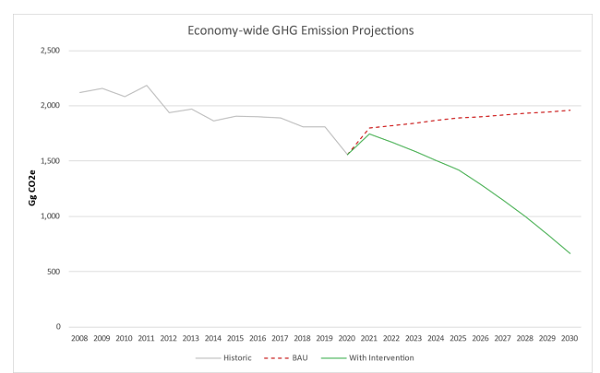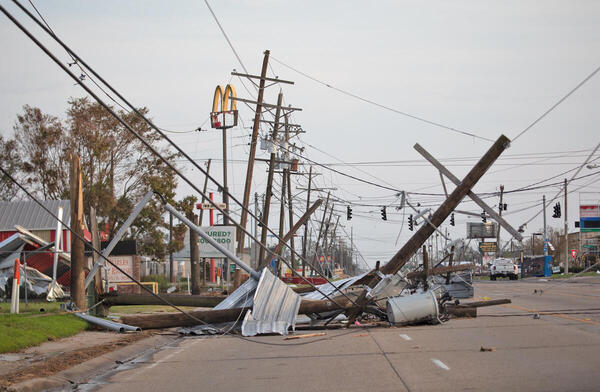En matière d'énergie, Barbade suit "la voie norvégienne"

Que recouvre cette expression ? Elle renvoie à la politique énergétique de la Norvège, seul pays d'Europe de l'Ouest, avec l'Ecosse, à disposer de gisements importants de gaz naturel et de pétrole. Cela consiste à développer chez soi au maximum les énergies renouvelables tout en se privant pas d'exploiter et d'exporter les énergies fossiles qui se trouvent dans son sous-sol.
Barbade fait exactement pareil comme on peut le voir dans l'article ci-après. Tout est mis en oeuvre, selon la Première Ministre Mia Mottley, pour qu'en 2030, la majorité des Barbadiens disposent de panneaux solaires sur le toit de leurs maisons et d'une voiture électrique dans leur garage. Cela n'empêche pas l'île de délivrer des permis de recherche à des compagnies internationales comme la BHP (Australie) en vue de rechercher du pétrole et du gaz. A noter que s'agissant du gaz, la Barbade en produit déjà depuis longtemps...
***
Barbados pursues ‘Norwegian model’: going green at home and drilling for oil
Published on 14/09/2021, 12:28pm
The Caribbean nation wants its vehicles and electricity to be almost completely renewable by 2030 but supports oil and gas development for export.
By Joe Lo
The Caribbean nation of Barbados is pursuing what a key official called the “Norwegian model” by exporting oil and gas while cleaning up its own cars and electricity production.
The government recently submitted plans to the UN to make 100% of its cars run on electricity or alternative fuels and to get 95% of its electricity from renewable sources by 2030.
“Our vision is that by 2030 most Barbadian homes will have solar PV panels on their roofs and an electric vehicle in their garage,” prime minister Mia Mottley said in December.
At the same time, the government is supporting two oil and gas exploration schemes in its Caribbean waters. One is with Australian company BHP and the other is with the government of Trinidad and Tobago.
Climate envoy Hugh Sealy said the government planned to support oil and gas production but not use it domestically. He called this the “Norwegian model”. “If we find oil and gas offshore, we can’t ignore it but it cannot be used in our domestic economy,” he said.
Barbados’s updated climate plan aims to reduce the island state’s emissions, relative to a business as usual projection, 35% by 2030. This rises to 70% if it gets financial support from other countries.

Barbados’s projected emissions. Business as usual is in red. Its conditional target is in green (Photo: Government of Barbados/Screenshot)
On the international stage, Mottley has led calls for green debt relief and received a prominent billing at the UK’s December 2020 climate ambition summit, speaking ahead of India’s Narendra Modi and the Pope.
The plan involves pivoting rapidly from oil for power generation to rooftop solar and wind with battery storage. As of 2015, over 90% of Barbados’s electricity came from imported oil and World Bank data shows the price of electricity is 60% higher than the global average.
As well as the climate benefits, reducing reliance on oil imports has financial benefits, Sealy said. In an island exposed to hurricanes, rooftop solar power is more resilient than centralised generation distributed through power lines, which can be knocked over by strong winds.
The government hopes to launch a revolving fund, through which Barbadians are loaned the money for rooftop solar panels and pay back the government from the savings on their energy bill.
Sealy said that this pace of transition involved a cost premium of up to 30% compared to a natural progression towards renewable energy. “But we’re prepared to pay that cost premium because we recognise this something that we have to do.”
It would not necessarily lead to higher bills for consumers, he said, as that depended on oil price fluctuations, the pace of renewable cost reductions and sale of carbon credits.

Hurricane Laura takes down power lines in Louisiana in 2020. (Photo: Julie Dermansky/Greenpeace)
As solar and wind energy are variable, energy experts have debated whether they can be relied on to provide 100% of a country’s energy.
Sealy said: “You can’t have an unreliable electricity sector… no tourist is going to want to come to an island where the air conditioning cuts out all the time.”
But he said that that grid operator Emera had worked with North American consultants on its energy plan and found that it was technically feasible.
On vehicles, Barbados’s plans are one of the most ambitious in the world. They plan to make all passenger vehicles run on electricity or alternative fuels by 2030.
This is arguably more ambitious than the plans of countries in Europe or North America, which have pledged only to ban new sales of internal combustion engine (ICE) cars by a given date between 2030 and 2040.
Conservationists set out ‘nature positive’ vision for global biodiversity deal
Sealy said that if Barbados banned ICE sales today, the lifetime of vehicles means around 30% of the vehicles on the roads in 2030 would still be ICE.
So, while this transition from ICE to electric vehicles takes place, he said that ICE vehicles will have to run partly on ethanol, biodiesel and biogas.
Julius Adiatma, biofuel researcher at Indonesian think tank IESR, told Climate Home News that, without modifying an ICE, they can only use between 10% and 30% ethanol or biodiesel. The rest of the fuel must be traditional fuels like petrol.
Altering vehicles so they can run just on ethanol would be a “new investment that will take some time to pay back,” he added. “This may slow down the rate of electric vehicle sales, as people will probably wait for another 10+ years after their investment before switching to electric vehicles.”
Francis Johnson, Stockholm Environment Institute researcher on biofuels, said Barbados can make fuel from homegrown crops like sugarcane.
Around the world, electric vehicle uptake is often hindered by a lack of charging facilities and “range anxiety”. But Barbados is so small, Sealy said, that you can go around three times with one battery charge.
- Se connecter ou s'inscrire pour publier un commentaire
- 90 vues
Connexion utilisateur
Dans la même rubrique
24/02/2026 - 11:37
29/01/2026 - 10:42
de Ali Attar
19/01/2026 - 13:44
Commentaires récents
Derrière la diabolisation de Mélenchon, la haine du "bougnoule"
IL A DEJA EU LIEU...
Albè
27/02/2026 - 21:35
....sur TOUT LE CONTINENT américain quand les Européens ont massacré les Indiens. Lire la suite
Derrière la diabolisation de Mélenchon, la haine du "bougnoule"
Yug , yug ou ...yug ?
yug
27/02/2026 - 17:26
Ouais assez marrante cette évocation des sens du mot yug ( à condition qu'elle soit vraie et ne s Lire la suite
Derrière la diabolisation de Mélenchon, la haine du "bougnoule"
Yug-hitler= intello?
@Lidé
27/02/2026 - 17:19
Albè je crois que yug-hitler va trouver de mots équivalents pour purifier la langue françoise, de Lire la suite
Derrière la diabolisation de Mélenchon, la haine du "bougnoule"
Yug-hitler= intello?
@Lidé
27/02/2026 - 17:18
Albè je crois que yug-hitler va trouver de mots équivalents pour purifier la langue françoise, de Lire la suite
L’ATTAQUE RUSSE EST CONDAMNABLE MEME SI LA POLITIQUE IMPERIALE DE L’OCCIDENT EN EST LA CAUSE
COMMENTATEUR AU BOIS DORMANT ?
Albè
27/02/2026 - 15:13
Cet article date d'il y a...4 ans. De 2022 donc ! Lire la suite
Top 5 des articles
Aujourd'hui :
- Jòdi-jou, kréyol matjé tibwen toupatou
- Dr Weibert Arthus anbasadè defakto nan ottawa demaske
- Sosyete Prèt Sen Jak yo pèsikite sou Francois divalye, 5 nan misyonè sa yo fenk kidnape sou Rejim Jovenel MOISE.
- An lot manniè konsivwè divini Matinik
- Mo mawot
Depuis toujours :
- Tous les présidents et premiers ministres de la Caraïbe sont vaccinés
- L'intolérable appauvrissement intellectuel et culturel de la Guadeloupe et dans une moindre mesure de la Martinique !
- LETTRE OUVERTE AU 31ème PREFET FRANCAIS DE MARTINIQUE
- L'arrière-grand-père maternel de Joan Bardella était...algérien
- Les triplement vaccinés contre le covid ne bandent plus





